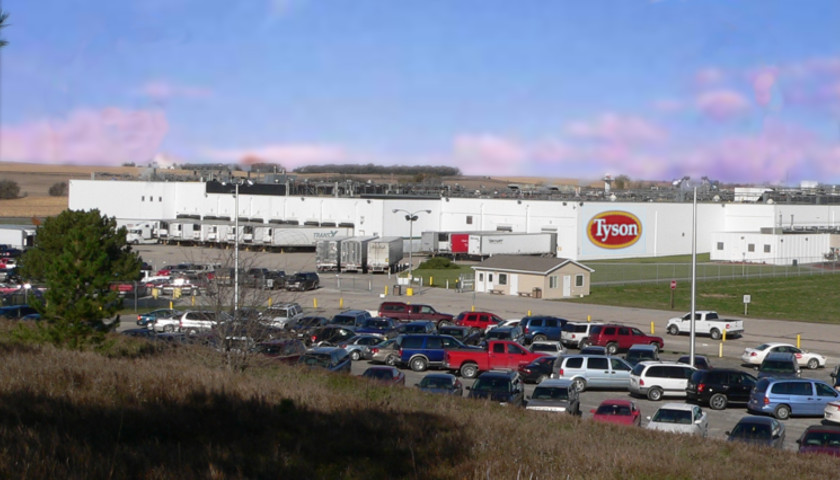Despite lacking mandatory permits from the Tennessee Department of Environment & Conservation (TDEC), Tyson Foods went ahead and broke ground yesterday for its new chicken processing plant in Humboldt.
After reviewing Tyson’s application for a permit to discharge storm water from the Humboldt plant construction site, a letter dated May 18, 2018, from the TDEC Division of Water Resources informed Tyson that the company’s “Storm Water Pollution Prevention Plan (SWPPP) “was deficient so no permit could be issued.
TDEC’s letter cautioned Tyson’s Senior Project Engineer Larry Jackson, that “[n]o discharges of stormwater associated with construction activity are authorized by the general permit until the completed NOI [Notice of Intent] is submitted and Notice of Coverage issued by the division.”
The NOI submitted by Tyson Farms, Inc., as referenced in the May 18 TDEC letter was “submitted to obtain coverage under a General National Pollution Discharge Elimination System Permit for Storm Water Discharges Associated with Construction Activity.”
Jackson was also directed to review “the enclosed checklist for deficiencies in the SWPPP that must be addressed before permit coverage can be issued.”
You can read the May 18, 2018 letter from the TDEC to Tyson’s Jackson here:
DWR-TNR122070-Notice of Deficiency-18-MAY-18-2366
The Tennessee Star asked Tyson Foods’ spokesman Gary Mickelson to confirm or deny that the deficiencies in the companies SWPPP noted by the TDEC remain uncured as they proceeded with the ground-breaking. No response was received from Tyson Foods.
Tyson Foods is reputed to be the largest meat processor in the U.S. with plants spread across multiple states. Even though the company is not new to the business of constructing meat-processing plants, it was noted by TDEC that Tyson’s application for the stormwater discharge permit was submitted without identifying a contractor responsible for sediment and erosion controls on the construction site.
In addition, TDEC flagged Tyson’s stormwater pollution prevention plan because it directed construction site stormwater discharges to the Middle Fork Forked Deer River and the Duffy and Barnett Branch streams which Tyson incorrectly listed as not being on the “impaired and threatened waters” list, which they are as indicated in the checklist notes attached to the May 18 letter:
Since the discharge from the proposed construction site may contain significant amounts of silt, the division considers the potential for degradation to the receiving stream from the discharge to be significant.
The short-hand for “Impaired and threatened waters” is 303(d) listed in reference to Section 303(d) of the Clean Water Act. The bodies of water so listed are subject to EPA approved “total maximum daily loads” for pollutants.
Clean Water Act violations related to “unlawful dumping of untreated wastewater” by a Missouri Tyson Foods facility were finally resolved in February 2017, with a $2 million criminal fine, two years of probation and a $500,000 payment to remedy the harm caused by the 2014 wastewater dumping. The civil suit was settled with the state of Missouri in 2015. The violations stemmed from Tyson discharging a liquid food substance used in its animal feed into the city’s sewage system which then flowed into a waterway causing a large fish kill.
Last summer, the Virginia State Water Control Board rejected fines recommended by the state’s Department of Environmental Quality against Tyson’s Temperanceville plant. The fines were to be levied for the plant’s failure to comply with the level of pollutants allowed by its permit for stormwater and wastewater discharges made into a tributary listed as a 303(d) “impaired waters.” The concern expressed by environmental advocates was that the fine was too low to deter future permit violations.
The media arm of the progressive Center for American Progress claims that Tyson Foods “dumps more pollution into waterways each year than ExxonMobil.” Mighty Earth, an environmental advocacy organization has charged that Tyson Foods is the leading contaminator from manure and fertilizer pollution.
The Tennessee Star asked Tennessee’s Department of Environment & Conservation whether since the May 18 TDEC letter, there was an approved plan for the Tyson plant and if so, to please provide details.
TDEC was also asked about the $540,000 loan to Humboldt for Wastewater Treatment Plant Renovation and Improvements and whether it was related to the anticipated load that will result once the Tyson plant is operational? If so, who repays the loan and would the loan repayment result in a rate increase to Humboldt/Gibson county residents?
No response was received from TDEC.
Gibson County Mayor Tom Witherspoon credits Randy Boyd for helping “Gibson County stay in the race to land the Tyson Foods plant.”




